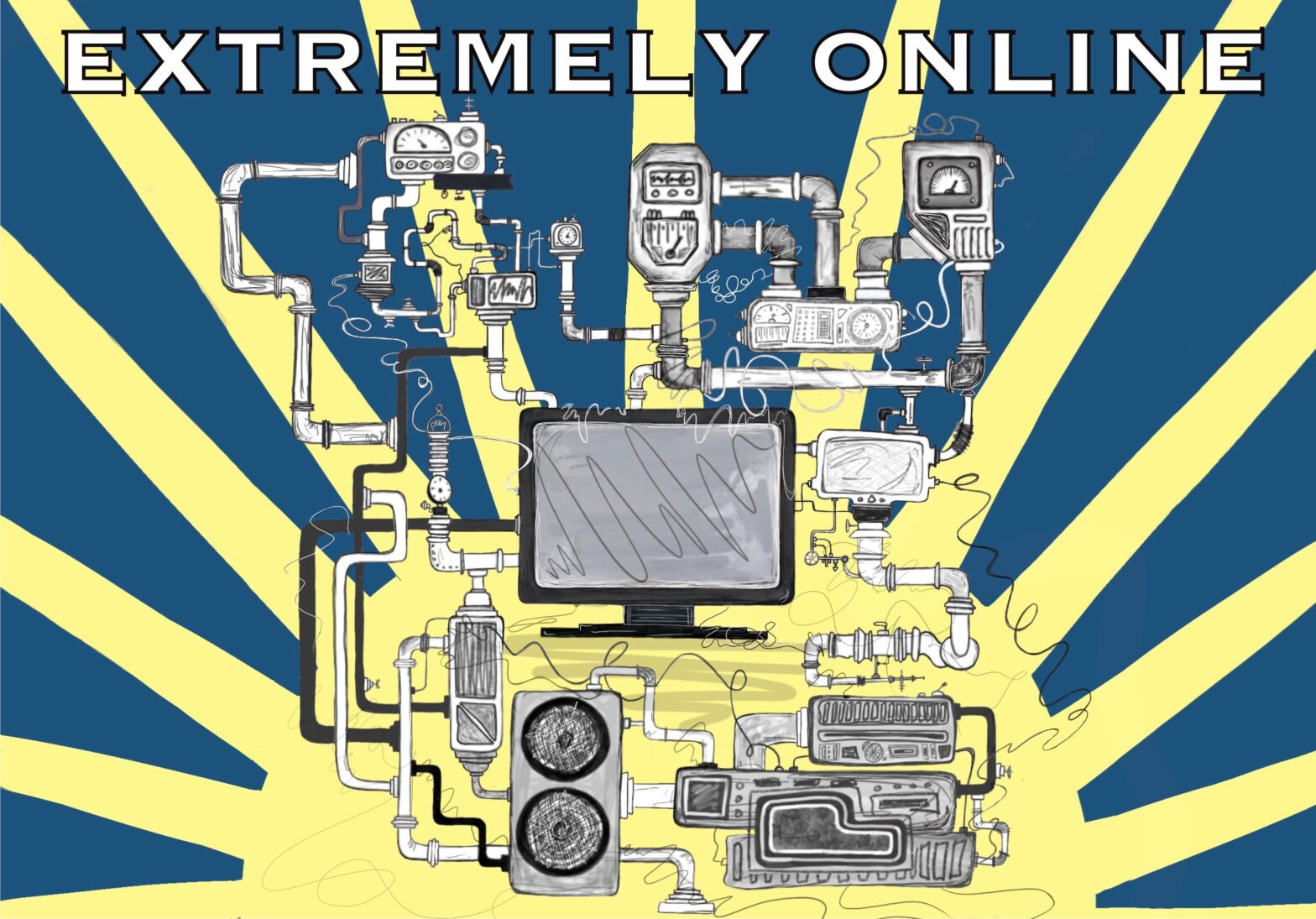“Every single time I get out of the shower, I think of that Vine.”
“There’s so many Vines that are ingrained in my brain that will play at different moments. But for whatever reason, that one I think of on an almost daily basis.”
This is what esteemed tech journalist and influencer Taylor Lorenz had to say when asked to recall one of her all-time favorite internet moments during a phone call with The Free Press. The Vine she’s referring to is from 2015 and features a shirtless man recording himself in the reflection of his bathroom mirror and reciting his own viral mantra, “Shower time, Adderall, a glass of whiskey, and Diesel jeans” — which he appeared to live by.
The Vine has been viewed millions of times, leading people to speculate on the creator’s identity and intention and uploading parody Vines under the tags “#showertime” and “#dieseljeans.” While on the surface level, this may just be a funny video, it is retrospectively a microcosm of the much larger memetic internet culture that has vastly impacted the way humans communicate and share their lives digitally.
Modern society has become “extremely online.” According to 2023 data from GWI, the average person spends nearly seven hours per day using the internet, two and a half of those hours using social media, while the world as a whole spends close to 12 billion hours using social media platforms each day. While it can be easy to fall under the hypnotic spell of the infinite scroll, Lorenz has taken a step back to reexamine the roots of the social internet itself.
Lorenz’s new book, Extremely Online: The Untold Story of Fame, Influence, and Power on the Internet, offers a unique view of Internet history via the lens of the user. As can be seen in films like The Social Network and The Internship and books such as Steve Jobs and The Facebook Effect, stories about the internet often romanticize technology companies and their creators and are typically told exclusively from their perspective. Extremely Online resculpts this narrative, giving users a voice as Lorenz explores the rise, decline, and cultural impact of an array of social media platforms, the creation of the “influencer economy,” and the untold stories of the many women who played a pivotal role in transforming digital culture and commerce with their blogs. In the rapidly evolving digital era — with AI technology, the Metaverse, and trials to embed the internet within the human brain — books like this one have never been more relevant.
Becoming a voice for internet users
Taylor Lorenz is currently a columnist for the Washington Post, with previous stints at The Daily Beast, Business Insider, The Daily Mail, and as a technology reporter for The New York Times. Despite making frequent appearances on mainstream networks and having a successful career in legacy media, she has by no means shied away from criticizing corporate narratives.
“I started as a blogger. Back in 2009, I had graduated college, and I got really into Tumblr, which at the time was really ascendant,” Lorenz said,“[Tumblr] was this bridge product between straight-up blog culture and what social media would become. It was also a place where a lot of sub-communities and meme humor thrived and where so much of modern internet culture was birthed.”
While writing blog posts and creating meme-type Tumblr accounts, Lorenz began developing skills in social media marketing and building an online audience. Since she was studying the landscape of tech journalism at the time, she saw a glaring disconnect between the people on social media and the people responsible for documenting its use.
“I felt like a lot of what was being written about the internet was being written by people that didn’t really use it, especially the mainstream media; they would just write these articles that were really condescending and kind of out of touch with how people actually used the platforms.”
One of her primary goals as a journalist has been to change this.
“I write about tech, from the user side, I write about how people use technology, how it shapes culture, and I write a lot about social media; that’s what my book is about.”
Lorenz spent two and half years researching and writing “Extremely Online” alongside her work in journalism. To do so, she scrolled back in time to log into forgotten platforms and re-experience seminal moments of internet history.
“It was really fascinating to go back to the early 2000s and revisit the dawn of social media, you know, so much of it was so organic and indie back then because there was no real money in the space. It was just kind of wild to revisit when the money started to come in.”
In her book, Lorenz talks about a moment in 2004 when Heather Armstrong, “who was kind of like the queen of mommy bloggers,” decided to monetize her blog using ads for the first time.
“Just the vitriol and outrage she received, I mean, you would have thought she killed her own children. It was so crazy.”
“At the time, it was considered very radical to build an audience around your personality or family life and then monetize that; now it’s completely commonplace. There’s an entire industry built around that.”
The industry Lorenz is referring to is what’s been dubbed the influencer or creator economy. This encompasses the revenue of content creators on YouTube, Instagram, TikTok, Facebook, X (formerly known as Twitter), Snapchat, Substack, etc., as well as more exclusive pay-to-view platforms such as OnlyFans and Pateron. The global influencer market has almost tripled in size since 2019. In 2023, the market was estimated at a record 21.1 billion U.S. dollars.
Lorenz points out the irony that a now multibillion-dollar economy, rooted in the self-monetization and pioneering of once taboo “Mommy Bloggers,” has been domineered and, in many respects, destroyed by mega-corporations and egotistical venture capitalists like Elon Musk.
“The influencer theater economy started as this really liberatory thing allowing women like Heather — who were excluded in the workforce and other kinds of people that were marginalized out of traditional media — to monetize and build their own audience and, of course, that’s still true, but now it’s just that industry has been so warped by capitalism. It’s almost unrecognizable.”
In her book, Lorenz notes that “early mommy bloggers” pushed traditional media to talk about things like “postpartum depression” or “not always loving your children” and, in doing so, helped bring these more forbidden topics into the public sphere and “break the super misogynistic bubble of mainstream media,” although she admits there remains much to be done.
Virtual sexism and the double standards of influencer fame
Another figure discussed at length in Extremely Online is Julia Alison, who was also featured in Lorenz’s recent exclusive for Rolling Stone, titled “She Invented Being an Influencer — And Was Vilified for It.” Much like Armstrong, Alison became an influencer before such a thing truly existed and had burrowed its way into the collective consciousness. As a result, she was subjected to patriarchal ridicule, highlighting a clear double standard when compared to male influencers like Casey Neistat and Mr. Beast, who not only capitalized on the creation of this new market to the tune of millions of dollars but were championed by fans and the media for doing so. According to Lorenz, many of the men were viewed as heroes and revolutionaries, while the early women of the internet were viewed largely as pathetic attention seekers.
Lorenz is no stranger to this type of sexism and online scrutiny. In April of 2022, Tim Pool, a right-wing political commentator and podcast host, facilitated a Times Square billboard attack attempting to dox her and other family members. In the same series of events, Elon Musk suspended Lorenz from X (Twitter at the time) and issued a public statement. Musk sided with Pool, stating Lorenz had herself doxed the admins of a conservative TikTok by the username of “Libs of TikTok” in her article written for The Washington Post. Lorenz has denied this.
She believes it’s vital to revisit cases like Armstrong and Alison’s because these women paved the way for thousands of influencers to follow without ever receiving public vindication or having their stories properly reexamined.
The past, present, and future of social media
For Lorenz, revisiting a lot of these platforms with hindsight was a fascinating experience —in particular, Vine. The social media app was born in 2012 and exploded in popularity, becoming one of the first Gen-Z platforms responsible for creating the influencer economy, introducing meme culture, and redefining the concept of virality. “it was a relatively small app that had just such a huge cultural impact,” she said.
While Vine may have officially died back in 2017, many of its viral moments live on in the minds of millions. In 2020, Instagram revealed that one million memes are shared on the platform every day, proving just how integral these platforms are to everyday life. Whether it be memes, vines, tweets, message boards, etc., what separates these temporary moments from the ones we experience in the real world is that they can be revisited with a few clicks: the legacy of the creator immortalized in code: Diesel Jeans forever.
The internet provides us with a much-needed outlet for lighthearted humor and can distract us from the often bleak, hyper-repetitive, hyper-serious norms of capitalist society. But there’s a darker, more insidious side of the internet, such as 4chan and Gamergate, which Lorenz also addresses in “Extremely Online.”
“The reason I wrote this book is I think we’re sort of at this pivotal moment where a lot of things are in flux. We have these big social networks starting to atrophy, like Facebook, which has been around at this point for the better part of two decades — and you have platforms like Twitter also in decline. I think there’s finally room for competitors.”
As Lorenz sees it, there are two possible futures for the internet: the first being where “we continue to have our social experiences online dominated by these hyper-corporate entities that just want to exploit our attention for nefarious purposes and maximize profit” or alternatively, a much better future “where there’s more diversity in terms of social platforms and more diverse ways to connect online.”
Despite the tumultuous climate of the internet and its future hanging in the balance, Lorenz believes there’s reason to be optimistic and insists that social media’s real power rests in the users’ hands, not the corporations. In her view, it’s vital to educate ourselves about the internet and recognize that the success of these social media companies and their CEOs depends entirely on how users create and interact with online content. Without the people who log in, browse, share, post, and comment, these platforms become digital ghost towns with zero market value.
“I do think we’re in this weird, transitory state where we’re going to start seeing the next platforms emerge because these old platforms are stagnant. I just hope people can build less profit-driven social platforms. I know that’s such a pipe dream because it’s America, but I really hope it happens, even if it’s just in small ways.”

October 2, 2023, at 7 p.m., Strand Bookstore will be hosting Lorenz for the NYC launch of “Extremely Online: The Untold Story of Fame, Influence, and Power on the Internet.”
The book will be officially released on Oct. 3, and on Oct. 4, there will be a launch party at 7 p.m. at The Freehand Hotel hosted by Joshua Citarella and Neoliberalhell featuring live DJ sets.








Leave a Reply